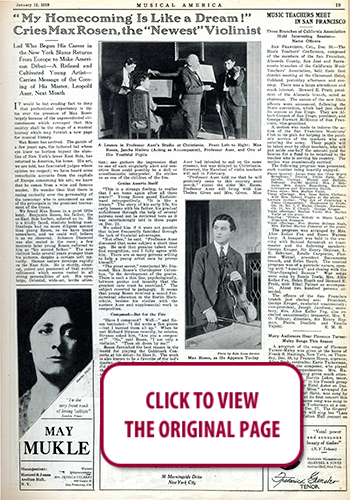 100 YEARS AGO IN MUSICAL AMERICA (226)
100 YEARS AGO IN MUSICAL AMERICA (226)
January 12, 1918
Page 19
“My Homecoming Is Like a Dream!” Cries Max Rosen, the “Newest” Violinist
Lad Who Began His Career in the New York Slums Returns From Europe to Make American Début—A. Refined and Cultivated Young Artist—Carries Message of the Coming of His Master, Leopold Auer, Next Month
IT would be but evading fact to deny that professional expectancy is·tiptoe over the presence of Max Rosen largely because of the unprecedented circumstances which arranged that this country shall be the stage of a musical tourney which may furnish a new page for musical history.
Max Rosen has arrived. The gamin of a few years ago, the tattered lad whose eye knew no horizon beyond the slum-line of New York’s lower East Side, has returned to America, his home. His art, we are told, has fascinated judges whose opinion we respect; we have heard some remarkable accounts from the capitals of Europe concerning his art; we know that he comes from a wise and famous master. No wonder then that there is racing curiosity over the personality of the newcomer who is announced as one of the principals in the promised tournament of the titans.
We found Max Rosen in a quiet little hotel. Benjamin Rosen, his father, the ex-East Side barber, ushered us in. He is a kindly faced, resolute looking man. Stanhope had no more diligent mentor than young Rosen, so we have heard somewhere, and we could well believe it as we observed. Solomon Diamond was also seated in the room; a few moments later young Rosen referred to him as “his second father.” The new violinist looks several years younger than his pictures, despite a certain soft maturity. Human nature develops rapidly on the East Side. He is sturdy, clean-cut, poised and possessed of that native refinement which seems rooted in all strong personalities of art. His eyes, large, Oriental, wide-set, invite attention; one gathers the impression that no one of such singularly alert and sensitive lines could possibly be a dull or unenthusiastic interpreter. He strikes us as one of the children of the fire.
Genius Asserts Itself
“This is a strange feeling, to realize that I am home again after all these years!” Young Rosen gazed Eastside-ward retrospectively. “It is like a dream.” The story of his early life, his early lessons with his father, his gradual unfoldment through the help of several patrons need not be reviewed here as it was entertainingly told in these pages on Dec. 22.
We asked him if it were not possible that talent frequently famished through the lack of financial advantages.
“Not often,” he said. “Professor Auer discussed that same subject a short time ago. He said that genuine talent must find recognition, and I fully agree with him. There are so many persons willing to help a young artist once he proves himself.”
“The great secret,” interjected Mr. Diamond, Max Rosen’s Christopher Columbus, “is the development of the genius. There is such a thin line, psychologically, between genius and insanity that the greatest care must be exercised.” The subject reverted to pedagogy. It seems that young Rosen received a sound fundamental education in the Berlin .Hochschule, besides his studies with the austere Auer and supplemental work in composition.
Composed—But for the Fire
“Have I composed? Well—” and Rosen hesitated— “I did write a few pieces—but I burned them all up.” When he met Richard Strauss recently, he relates, Strauss asked him, “Are you a composer?” “No,” said Rosen, “I ·am only a violinist.” “Then sit down by me!”
Rosen furnished the best reason in the world for playing the Goldmark Concerto at his début: he likes it. The work is·also known to be a favorite of the lad’s master. Young Rosen remarked that he did not aim to bring out many novelties; the established master works of the old and “newer” masters will suffice for his programs, for the present at least, although he proposes to keep away from the more hackneyed compositions, e.q., “the Tschaikowsky and the Mendelssohn.”
War Disrupted Plans
Rosen’s stay here “is indefinite, probably for the duration of the war. “I must return to fill the engagements which the war canceled. Afterwards—who can tell?” He said that Professor Auer had intended to sail on the same steamer, but was delayed in Christiania. However, the Marchesi of violin teachers will sail in February.
“Professor Auer told me that he will positively come to this country next month,” stated the elder Mr. Rosen. Professor Auer will bring with him Thelma Given and Mrs. Given. Miss Given is said to be another candidate for high honors as an artist.
It is an ungrateful task to intrude on the time of an artist who is about to make his début, particularly under the unique circumstances; however, the fine perceptions of the young man tolerated the loss of the precious minutes—Jan. 12 is almost here. If we were rash enough we would predict that this lad in his teens, with his youngish ways, his impetuous frankness and his strangely mature thoughtfulness, will deliver an impressive message on Jan. 12. The East Side waits! —ALFRED HUMAN.




 RENT A PHOTO
RENT A PHOTO





